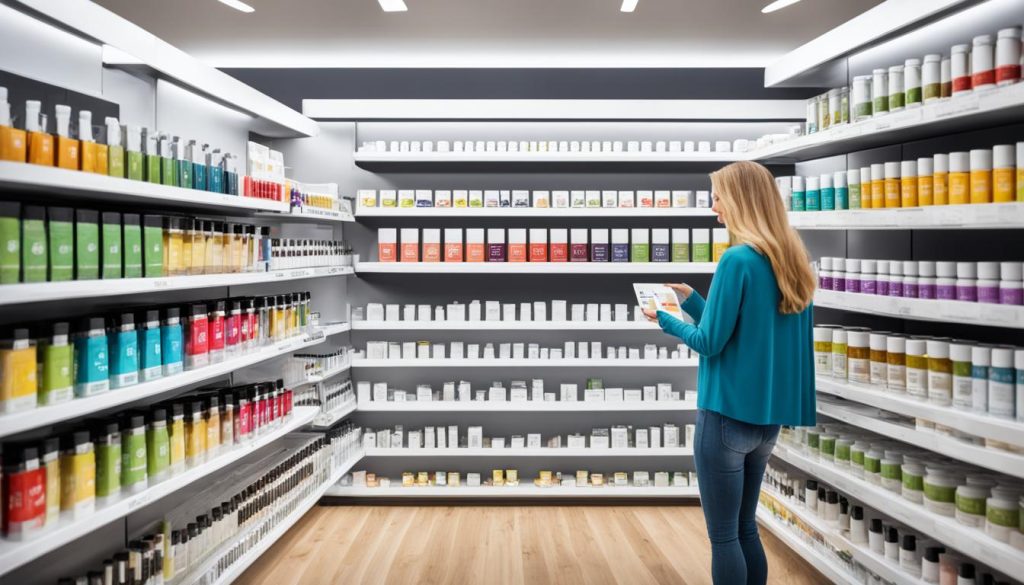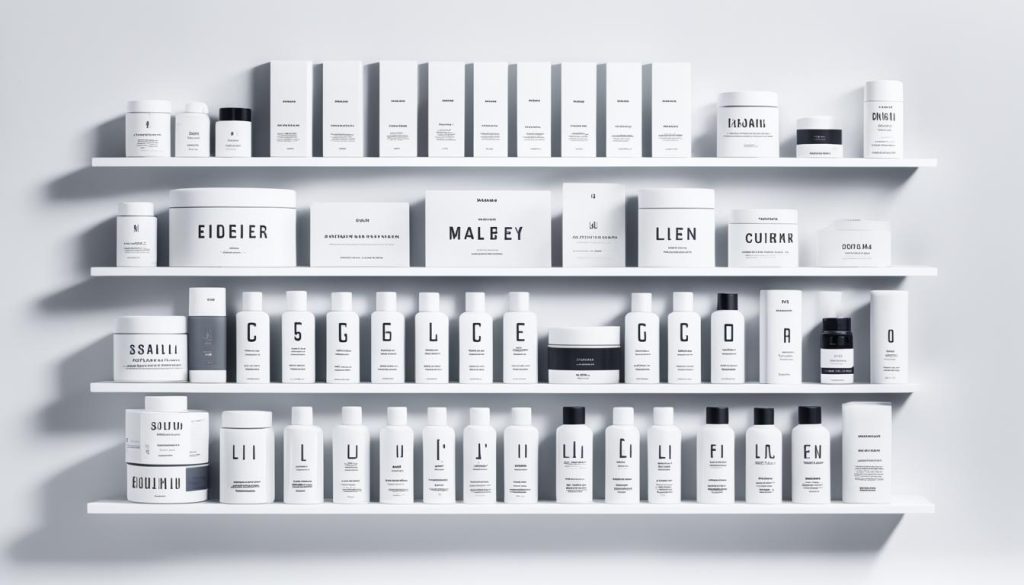Are you an aspiring entrepreneur or a brand wanting to grow your product range? Do you want to move away from third-party manufacturers and control your production? Private labeling could be the answer for you. But what is private labeling and how can it help you start and grow your brand?
Private labeling lets retailers work with private-label manufacturers to make unique products under their brand. You don’t have to start from scratch. Instead, you use the skills and production power of private-label manufacturers to make your ideas real. You keep full control over the design, materials, and how it’s made.
So, why think about private labeling your products? It lets you offer more products without spending a lot on research or big manufacturing setups. It’s a smart way to enter new markets and meet more customer needs.
Private-label brands also mean you could make more money. By cutting out the middleman and working directly with manufacturers, you can lower costs and boost your earnings. Plus, with your brand on the products, you can build loyalty and create a unique market presence.
But how does a private-label business work? What steps do you need to take to make your own private-label brand? Are there any challenges or things to think about? In this article, we’ll look into private labeling, its pros and cons, and give you tips and strategies to start and grow your own private-label brand.
Key Takeaways:
- Private labeling lets retailers make unique products under their brand name.
- It offers a chance to grow your product range and meet various customer needs.
- By cutting out the middleman, private-label brands can lead to higher profits.
- Private labeling means working with private-label manufacturers to make your product ideas come to life.
- While it has benefits, private labeling also has challenges and things to consider.
What is a Private-Label Product?
A private-label product is made by a manufacturer but sold under a retailer’s brand name. This lets retailers offer unique products without making them themselves. They can choose the design, materials, and other details, giving them control over their products.
Private-label products are different from white-label products, which are generic and made in large quantities. They are made just for a specific retailer. This means they can match the retailer’s needs and what their customers like.
Both retailers and manufacturers gain from private-label products. Retailers stand out by offering unique items. They can also control the quality and price of their products. Manufacturers get more business chances and can work with retailers for a long time.
Next, we’ll look into the benefits of selling private-label products. We’ll see how they help retailers and manufacturers succeed.
Benefits of Selling Private-Label Products

Selling private-label products has many advantages for retailers. It lets them control how the products are made. They can pick the materials, ingredients, and quality. This means they can ensure their products meet high standards.
It also means they can set their own prices. This lets retailers make more profit. Plus, they can quickly adapt to what customers want.
They have full control over how to market and brand their products. This is a great way to make their brand known and keep customers coming back.
Private-Label Product Ideas and Manufacturers
Private-label products offer endless possibilities. Retailers can explore many categories to meet different consumer needs and tastes. Here are some ideas and manufacturers to think about:
1. Apparel and Accessories
The market for apparel and accessories is big for private-label products. Retailers can offer things like backpacks, jeans, dresses, shoes, and more. It’s important to work with trusted suppliers to ensure quality and success. AOP+, Apliiq, and Modalyst are some top manufacturers in this field.
2. Cosmetics and Hair Care Products
There’s a big demand for private-label cosmetics and hair care products. Retailers can look into items like shampoo, moisturizer, sunscreen, and hair oils. Thomasnet is a great place to find reliable manufacturers in this industry.
3. Foods and Supplements
Private-label food and supplements are getting more popular. Retailers can check out items like cakes and pies, pasta, candy and chocolate, probiotics, and breakfast foods. Dripshipper is a top supplier in the coffee industry, offering high-quality private-label coffee products.
By offering a variety of private-label products, you can reach different consumers and follow market trends. Always research and work with manufacturers that share your brand values and quality standards.
How Does a Private-Label Business Work?
A private-label business starts with retailers making their own brand. They look into the market to find out what customers want. Then, they work with manufacturers to make products that fit these needs.
Private-label businesses often focus on specific areas. They use their knowledge of what customers like to make products just for them. This way, they stand out from others. It’s a good choice for big and small brands alike. It helps them save on making products and can make a big part of their sales.
Steps to Establishing a Private-Label Business:
- 1. Brand Establishment: Retailers create a unique brand identity that resonates with their target market and sets them apart from competitors.
- 2. Market Research: Retailers conduct thorough market research to identify consumer trends, preferences, and demands within their niche.
- 3. Product Development: Collaborating with private-label manufacturers, retailers develop high-quality products tailored to meet the specific needs and preferences of their target customers.
- 4. Manufacturing and Packaging: Private-label manufacturers produce the agreed-upon products, often customizing packaging and labeling to reflect the retailer’s brand.
- 5. Sales and Distribution Channels: Retailers establish sales and distribution channels, which may include online platforms, brick-and-mortar stores, or partnerships with other retailers.
- 6. Marketing and Promotion: Retailers implement effective marketing strategies to create awareness and generate interest in their private-label products. This may involve digital marketing, social media campaigns, and collaborations with influencers.
- 7. Feedback and Iteration: Continuous evaluation of consumer feedback allows retailers to refine their products, packaging, and marketing strategies to meet evolving consumer needs.
By following these steps, retailers can successfully build and grow their private-label business. They offer unique products that their target audience loves. This way, they make good money.
Advantages of Selling Private-Label Products
Selling private-label products has many benefits for retailers. One big plus is the control over production. Retailers work with manufacturers to pick materials and make decisions that meet their quality standards.
Private-label products also let retailers set their own prices. This means they can control profit margins and offer prices that draw in customers. By doing this, retailers can win over price-sensitive shoppers and grow their customer base.
Small retailers find it easy to adapt with private-label products. They can quickly change their offerings to match what customers want. This flexibility helps them stay ahead in the market by offering new products and meeting consumer needs.
With private-label products, retailers have full control over marketing and branding. They can create unique brands, increase brand awareness, and keep customers coming back. This helps build strong customer relationships and boosts repeat business.
Disadvantages of Selling Private-Label Products

Selling private-label products has many benefits, but it’s good to know the downsides too.
One big challenge is building loyalty from the start. New private-label brands don’t have the same story as well-known brands. This makes it harder to grab consumers’ attention.
Private-label sellers also rely a lot on manufacturers. If there are supply chain issues or quality problems, it can hurt their business. It’s crucial to pick reliable manufacturers to avoid these problems.
Another issue is that private-label products might not be as well-known. They don’t have the same brand trust as established brands. This can make it tough to draw in and keep customers, especially in crowded markets.
But, with careful planning, smart marketing, and quality control, private-label sellers can beat these hurdles. They can create strong brands that offer something special to customers.
The Private-Label Threat to Brand-Name Manufacturers
Brand-name manufacturers worry about the rise of private-label products. These products are becoming more popular, even beating national brands in some supermarkets. It’s key to see the good and bad in this trend.
Private-label brands are getting popular because people want good deals during tough times. They like these products because they’re cheaper and seem like a better deal. Retailers gain by making their own brands, saving money and taking less risk. They also get to create a brand that stands out.
Retailers can take a bigger piece of the market by offering their own brands. This makes things tough for brand-name brands. They have to compete with other brands and the growing private-label market.
To stay ahead, brand-name brands must change and innovate. They should focus on what they do best, invest in new ideas, and keep customers loyal. Working with retailers and making special products can also help fight the private-label threat.
The Changing Retail Environment
More people want better value and are looking for it in private-label brands. This change is making retailers offer their own brands. They’re giving customers quality products at good prices.
Supermarkets have done well with their private-label brands. They offer food, household items, and personal care products at lower prices without losing quality. This has changed the way brands compete.
The threat from private-label brands isn’t just in physical stores. Online shopping has also made these brands more accessible. This gives customers more choices and cheaper options.
In the end, brand-name brands should see private-label brands as a chance to grow. By understanding what customers want and working with retailers, they can keep their edge in a changing market.
The Rising Popularity of Private-Label Brands

Private-label brands are getting more popular around the world. This is because people want affordable products and value more when money is tight.
In the US, private-label sales hit $199 billion in 2021. Experts think they will keep growing. In Europe, countries like Germany and France are seeing big increases in these sales.
Retailers see a big chance with private-label brands. They make their own lines to offer cheaper options without losing quality. This lets them compete with big brands.
Private-label brands are great for those on a budget. They offer quality products at lower prices. This is similar to well-known brands but costs less.
These brands also help retailers stand out. They can create their own unique products. This builds loyalty and makes them known for good value.
The growth of private-label brands is a big chance for retailers. They can offer more products and attract more customers. By knowing what customers want and market trends, they can make their private-label brands successful.
The Value of Private-Label Brands
Private-label brands bring great value to retailers. They let retailers fully customize their products. This means they can control the ingredients, packaging, and branding.
This customization helps retailers stand out. They can make products that meet their customers’ specific needs and likes.
Private-label brands are also very profitable. Retailers can set their own prices, which means they can make a good profit. By buying directly from manufacturers, they avoid the middleman and increase their profits.
These brands are also very adaptable. Small retailers can quickly make new products by working with third-party manufacturers. This lets them quickly follow new trends and change their products to what customers want.
Another big plus is their low operating costs. Since manufacturers make products for many retailers, the costs are shared. This makes it cheaper for each retailer to keep prices low and still make a good profit.
Private-label brands are getting more popular for many reasons. They offer customization, make more money, are adaptable, and are cost-effective. These benefits help retailers stand out and compete well in today’s fast-changing market.
To better understand the value of private-label brands, let’s take a look at the image below:
The image shows different private-label brand products. It highlights the variety and potential in this area. By using private-label brands, retailers can create unique products and gain loyal customers.
Steps to Creating Your Own Private-Label Brand

Starting a private-label brand takes several steps. First, retailers must research their niche and learn what their customers want. This helps them pick the right products to sell.
Then, they select products that make good money and fit well together. This careful choice lays a solid base for their brand.
Next, finding reliable manufacturers is key. Retailers must talk clearly and negotiate good prices and delivery times.
After picking products, it’s time to build the brand’s identity. This means creating a unique name, logo, and values. They also need to design packaging that stands out and draws in customers.
Finally, launching the brand is the last step. Retailers should use both online and offline marketing to get noticed. Working with influencers or running ads can also help reach more people.
By doing these steps, retailers can make a successful private-label brand. This taps into the growing demand for such products in the market.
Creating a Strong Brand Image
Having a strong brand image is crucial for a private-label brand’s success. Retailers need to make a brand that speaks to their audience and stands out from others. This means having a good brand story, consistent messages, and attractive designs.
They should also focus on giving great customer experiences to keep customers coming back. This builds loyalty and helps the brand grow.
With a strong brand and smart marketing, retailers can make their private-label brand a top choice for customers. This leads to more sales and growth.
Challenges and Considerations in Private-Label Branding
Private-label branding has many benefits but also comes with challenges. Retailers need to know the potential hurdles when they start in the private-label market.
Building Customer Loyalty
One big challenge is building customer loyalty from the start. New private-label brands often find it hard to win over consumers. Retailers must work on building their brand and marketing to create a good name and trust with customers.
Dependency on Manufacturers
Private-label brands depend a lot on their manufacturers for quality products. But this can be risky. Problems in the supply chain, like delays, can affect their products. Retailers also need to make sure their products are up to standard to keep customers happy.
To avoid these risks, retailers should pick reliable manufacturers and keep strong partnerships. Good communication and quality checks are key to a successful private-label brand.
Competition and Market Saturation
The private-label market is very competitive, with many retailers fighting for customers. With more retailers going private-label, the market gets crowded. Retailers must make their brand and products stand out to keep customers.
Brand Reputation
Having a good brand reputation is vital in private-label branding. Without an existing brand, retailers must work hard on marketing to gain trust and credibility. This means having a clear brand identity, running effective marketing campaigns, and offering great customer service.
Overcoming these challenges needs careful planning and strategic thinking. By tackling these issues, retailers can make their private-label brands successful and find their own spot in the market.
Start Your Private-Label Business Today
Now is a perfect time to start your own private-label business. With the growing interest in these brands, you can make your dream come true. Just follow the steps and strategies in this article.
First, do your homework on your market. Look for areas where private-label brands are needed most. This will guide you in picking the right products and standing out from others.
Then, find reliable manufacturers for your products. It’s key to work closely with them for your business to succeed. Make sure you talk clearly and build a partnership that works for both sides.
Lastly, make your brand stand out. Spend time on a strong brand story, logo, and packaging. This will set your brand apart and draw in loyal customers.
Starting your private-label business opens up many opportunities. Take the steps, use the strategies, and launch your brand with confidence. Begin today and enjoy the benefits of this growing market.
















